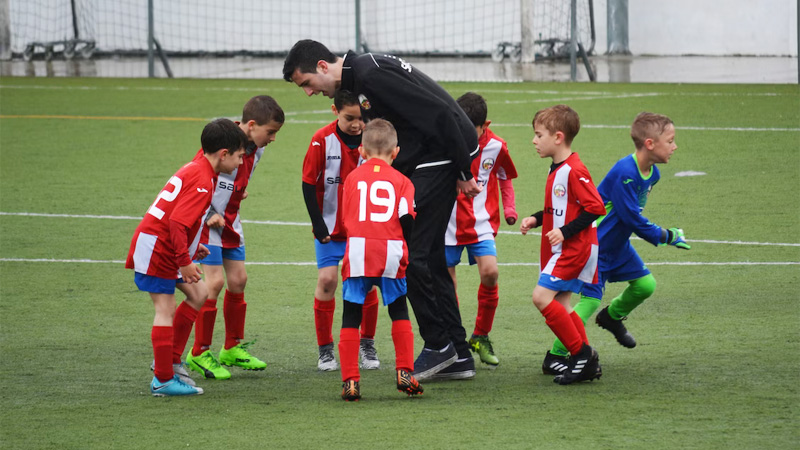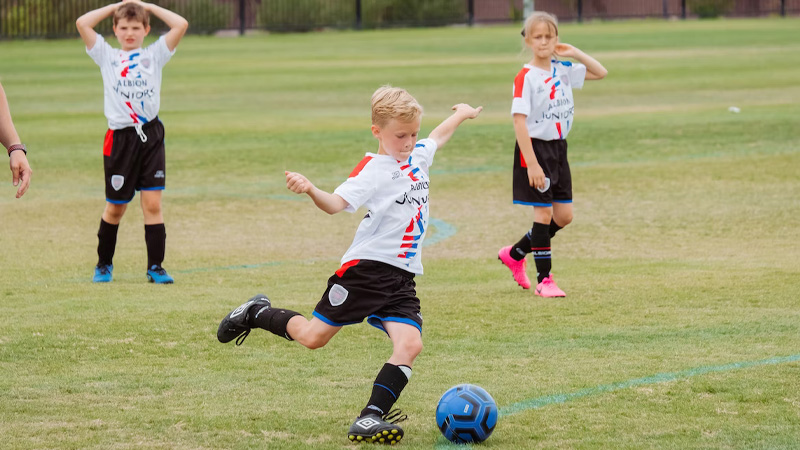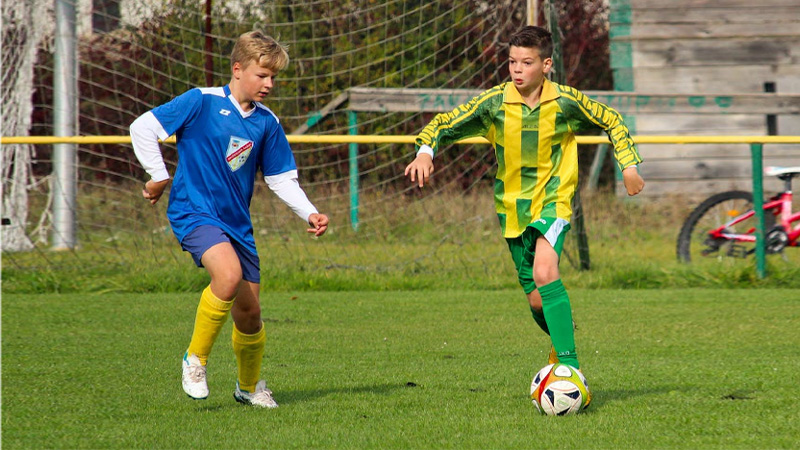The question of the best age to start soccer is one that often piques the curiosity of parents, educators, and sports enthusiasts alike.
Soccer is a sport that captivates millions around the world, and introducing children to the game at the right time can significantly impact their enjoyment, development, and long-term interest in the sport.
However, determining the ideal age to begin soccer involves considering a variety of factors, including physical readiness, emotional maturity, social skills, and the child’s individual interests.
This exploration seeks to shed light on the various determining factors that can guide parents and caregivers in making an informed decision about when to introduce their child to the beautiful game of soccer.
What Is The Best Age To Start Soccer?
The best age to start soccer can vary depending on several factors, as each child’s development, interests, and physical abilities differ.
Here are some determining factors to consider when deciding the ideal age to introduce a child to soccer:
Physical Development
Children should have developed sufficient motor skills, coordination, and balance to participate in soccer activities comfortably. Typically, this readiness starts around ages 3 to 4, when children can run, kick, and handle basic movements.
Interest and Enthusiasm
A child’s interest and enthusiasm for the sport are crucial. If they express curiosity about soccer and show eagerness to play, it may be a good indicator that they are ready to start.
Social Skills
Soccer involves teamwork and communication. Starting at an age when children can interact with others and follow basic instructions enhances their overall experience.
Emotional Maturity
Soccer can be emotionally challenging, especially during competition. Children should have a certain level of emotional maturity to handle wins, losses, and teamwork dynamics.
Safety
Ensuring the safety of young players is essential. Parents and coaches must provide a safe environment, and equipment should be suitable for the child’s age and size.
Parental Support
The involvement and support of parents play a significant role in a child’s soccer journey. Encouragement and positive reinforcement from parents can foster a love for the sport.
Available Resources
The availability of soccer programs, coaches, and facilities in the community can influence when a child can start playing.
Balance with Other Activities
Considering the child’s schedule and commitments to other activities is essential to avoid overloading them with too many commitments.
Local Soccer Culture
In some regions, soccer is deeply ingrained in the local culture, and children may naturally start playing at a younger age due to societal influences.
Learning Environment
Choosing an age-appropriate learning environment with age-specific drills and activities can enhance a child’s development and enjoyment of the sport.
Time Commitment
Assessing the amount of time the child can dedicate to soccer without overwhelming their daily routine is crucial.
Long-Term Goals
Evaluating the child’s long-term interest in soccer can help determine the right age to start. Starting early may be beneficial for children aiming for professional or competitive paths.
Enjoyment
Ultimately, the best age to start soccer is when a child finds joy and pleasure in playing the sport. Whether they start at a young age or later in childhood, prioritizing their enjoyment is key to fostering a lasting love for soccer.
Considering these factors can guide parents, coaches, and children in determining the best age to start soccer, ensuring a positive and rewarding experience for young players as they embark on their soccer journey.
What Is The Best Age To Start Soccer?

Determining the best age to start soccer involves considering several factors that impact a child’s physical, emotional, and social development. Here are some key determining factors to help guide the decision:
Physical Readiness
Starting soccer at an age when children have developed basic motor skills, coordination, and balance is essential. Typically, this readiness begins around ages 3 to 4, when kids can run, kick, and handle basic movements necessary for soccer.
Interest and Enthusiasm
A child’s interest and enthusiasm for soccer play a significant role. If they show curiosity about the sport and display eagerness to participate, it can be a positive indication that they are ready to start.
Social Skills
Soccer involves teamwork and communication. The best age to start is when children can interact with others and follow simple instructions, enhancing their overall experience.
Emotional Maturity
Soccer can be emotionally challenging, particularly during competitive situations. Choosing an age when children have a certain level of emotional maturity to handle wins, losses, and team dynamics is beneficial.
Safety
Ensuring the safety of young players is of utmost importance. Parents and coaches must provide a safe environment, and equipment should be appropriate for the child’s age and size.
Parental Support
The involvement and support of parents are crucial in a child’s soccer journey. Encouragement and positive reinforcement from parents can foster a love for the sport.
Available Resources
The presence of soccer programs, coaches, and facilities in the community can influence the best age to start soccer.
Learning Environment
Choosing an age-appropriate learning environment with activities and drills suitable for the child’s age can enhance their development and enjoyment of the sport.
Long-Term Goals:
Evaluating the child’s long-term interest in soccer can help determine the optimal age to start. Starting early may be beneficial for children aiming for professional or competitive paths, while others may prefer to begin later to explore different interests.
Ultimately, the best age to start soccer is unique to each child, and considering these nine determining factors can help parents, coaches, and children make an informed decision, ensuring that the introduction to soccer is enjoyable, positive, and aligned with the child’s physical and emotional readiness.
Are Toddlers Too Young To Play Soccer?

Whether toddlers are too young to play soccer is a subject of debate among parents, educators, and sports enthusiasts.
Here are some points to consider when determining if toddlers should participate in soccer activities:
Physical Readiness
Toddlers may not have fully developed the motor skills, coordination, and balance required for organized soccer activities. At such a young age, their movements are often unsteady, making it challenging to engage in structured soccer play.
Attention Span
Toddlers typically have short attention spans and may struggle to stay focused during organized sports activities. Their ability to follow instructions and participate in team-oriented drills may be limited.
Safety Concerns
Soccer involves running, kicking, and potential collisions with other players or the ball. Toddlers may be more susceptible to injury due to their small size and limited control over their movements.
Enjoyment vs. Pressure
At a young age, toddlers should engage in activities that bring them joy and foster a love for physical play. Introducing them to structured sports like soccer too early may add unnecessary pressure and diminish the enjoyment of play.
Developmental Play
Toddlers can benefit from free play and unstructured physical activities that promote overall development. Playgrounds, games that encourage running and movement, and exploration in nature are more suitable for their age and developmental stage.
Early Exposure to Soccer
While toddlers may not be ready for formal soccer training, exposure to the sport through age-appropriate activities, such as playing with a soft soccer ball or kicking a ball in the backyard, can spark an interest in soccer as they grow older.
While introducing toddlers to soccer activities at a very young age may not be ideal due to their physical and developmental limitations, gentle exposure to the sport in a playful and unstructured manner can be beneficial.
Encouraging physical activity and exploration through age-appropriate games can set a foundation for a future interest in soccer and other sports as toddlers continue to grow and develop.
How Do I Pick A Soccer Coach For My Child?
Selecting the right soccer coach for your child is crucial to ensure a positive and rewarding soccer experience.
Here are some essential points to consider when picking a soccer coach:
Qualifications and Experience
Look for a coach with appropriate coaching qualifications and experience working with children of similar age groups. A coach with relevant certifications and experience can provide age-appropriate training and guidance.
Coaching Philosophy
Discuss the coach’s coaching philosophy to ensure it aligns with your child’s goals and values. A coach who prioritizes skill development, teamwork, and a positive learning environment is likely to have a more significant impact on your child’s growth as a player and an individual.
Communication Skills
A good coach should communicate effectively with both the players and parents. Clear and open communication fosters a healthy coach-player-parent relationship and ensures that everyone is on the same page regarding the child’s progress and development.
Understanding of Child Development
Look for a coach who understands child development and can adjust their coaching methods based on the players’ physical, emotional, and cognitive abilities. Age-appropriate coaching is essential for children to enjoy and benefit from the soccer experience.
Coaching Style
Observe the coach’s coaching style during training sessions or games. A coach who encourages and motivates players positively while providing constructive feedback is likely to create a supportive and encouraging learning environment.
Safety Measures
Ensure that the coach prioritizes safety during training and matches. They should be knowledgeable about injury prevention and have protocols in place to handle any injuries that may occur.
Parent Involvement
Consider a coach who values parent involvement and is open to discussing the child’s progress and development. A coach who welcomes parent feedback and collaboration can lead to a more supportive and inclusive soccer environment.
Reputation and Recommendations
Seek recommendations from other parents or players who have experienced coaching under the candidate. Positive feedback and a strong reputation within the soccer community can indicate a reliable and effective coach.
Trial Sessions
If possible, have your child attend a trial training session with the coach to observe their coaching style and the interaction with players. This firsthand experience can help you make a more informed decision.
Choosing the right soccer coach for your child can significantly impact their soccer journey and overall enjoyment of the sport.
By considering these essential points and taking the time to research and observe potential coaches, you can find a coach who will inspire, motivate, and support your child’s soccer development.
FAQ
What is the best age to start soccer for my child?
The best age to start soccer for a child is typically around 3 to 4 years old. At this age, most children have developed basic motor skills, coordination, and balance, making them more physically ready to participate in introductory soccer activities.
Is my child too young to start soccer if they are below 3 years old?
Yes, starting soccer before the age of 3 may not be ideal as toddlers may not have fully developed motor skills and attention spans required for organized soccer play.
What factors should I consider when deciding the best age for my child to start soccer?
Several factors should be considered, including physical readiness, interest and enthusiasm for the sport, social skills, emotional maturity, and safety. Additionally, evaluating the availability of suitable soccer programs, coaching, and resources in the community can help make an informed decision.
Is there a right age to start competitive soccer?
The right age to start competitive soccer may vary depending on the child’s skill level, interest, and emotional readiness. For some children, starting competitive soccer around 7 to 8 years old may be appropriate, as they have acquired fundamental soccer skills and can handle the competitive environment better.
What if my child is older and has never played soccer before? Is it too late to start?
It is never too late to start soccer. Many children and even adults begin playing soccer at various ages and go on to enjoy the sport. Age-appropriate coaching and training can help older beginners learn and improve their skills, allowing them to experience the joy and benefits of soccer at any age.
Conclusion
The best age to start soccer is a decision that should be approached with careful consideration of a child’s physical, emotional, and social development. As we’ve explored the determining factors, it becomes clear that there is no one-size-fits-all answer.
Each child is unique, and what may be suitable for one may not be for another. Balancing a child’s physical readiness, interest, safety, and enjoyment is essential in fostering a positive soccer experience.
Providing age-appropriate and enjoyable soccer experiences, whether through playful activities or structured coaching, can lay the foundation for a lifelong love of the sport.
As parents and caregivers, understanding the various factors and listening to the child’s cues can lead to a soccer journey that brings joy, growth, and lasting memories on and off the field.







